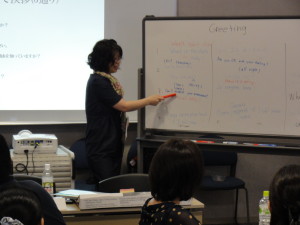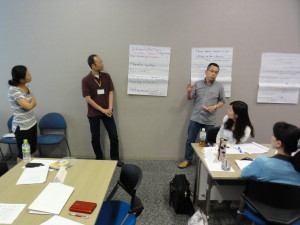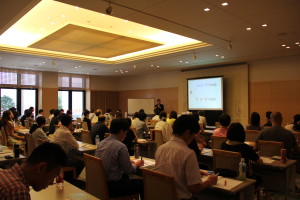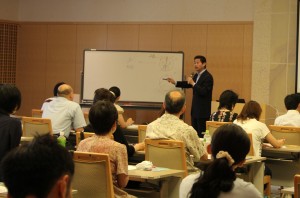Business Overview
In a situation where the environment surrounding universities is changing rapidly, the management and operation of universities has come to occupy an important position, and the role of university staff is becoming extremely important. In order to adapt to such an environment, we are developing a variety of projects to improve the qualifications of university staff, including management and education and research support.
As the globalization of higher education accelerates, such as the enhancement of support for international students and the promotion of collaborative projects with overseas universities, it can be said that the time has finally arrived when the English proficiency of university faculty and staff is indispensable as a basic ability.
The SD training program in response to globalization aims not only to improve the English proficiency of faculty and staff at member schools who can respond to such times, but also to raise their awareness of language learning in the future.
Outline of the event
2014 FD/SD English Skill Improvement Training for University Teachers and Staff
- Date
- Saturday, July 19, 2014 10:00~17:30
Saturday, July 26, 2014 10:00~17:30
Saturday, August 23, 2014 10:00~17:30
Saturday, September 6, 2014 10:00~17:30
Saturday, September 27, 2014 10:00~17:30 - Venue
- Campus Plaza Kyoto 5th Floor 2nd Joint Laboratory
- Organizer
- University Consortium Kyoto
- Contents
- FD/SD English Skill Improvement Training Outline [Click here for details]
Application
FD/SD English Skill Improvement Training Application Form
Implementation Report
English Voice Training
On Saturday, July 19, we invited Mr. Kazuhiro Takemura of the TLL Language Research Institute as a lecturer and held the first FD/SD English Skill Improvement Seminar “English Voice Training” for university faculty and staff, with a total of 60 participants from many member universities and junior colleges. This class was held last year and was very popular.
In the seminar, it is effective to conduct voice training after understanding the pronunciation of English and its characteristics as a language, so in the morning, while comparing English and Japanese, we explained the characteristics of English consonants and vowels, and the difference in pronunciation methods (English is the language of breath, while Japanese is the language of voice), A theoretical lecture was given on the difference in accents (English accents are added by strength and weakness, while Japanese is accented by pitch and low) with video materials.
In the afternoon, we practiced pronunciation based on the contents of the theory lecture in the morning. The pronunciation practice was systematically carried out according to the characteristics of the phonetic symbols, and the mechanism of mouth and tongue movement during pronunciation was illustrated using a white boat, making it a very practical and enjoyable training.
After the pronunciation practice, the students gave a lecture on the basic knowledge and know-how for giving presentations in English, as well as effective English learning methods.
In the questionnaire, “I was able to solve things that I didn’t understand on a daily basis,” and “It was good that I was able to take the course regardless of my level of English proficiency.” Comments such as “It was good to see the visible practical practice.”
English Skill Improvement Training “Active Learning in the Classroom”
On July 26, we invited Ms. Mikako Nishikawa, an advisor to the Japan Eiken Association, as a lecturer and held “Active Learning in the Classroom,” an English skill improvement training program for teachers at member universities.
This training was held as part of the “English Skill Improvement Training for University Teachers” conducted by the University Consortium Kyoto since 2013, and was held for faculty members with a focus on “classes” and was attended by 11 people from five universities.  In the training, following the icebreaker, active learning (active learning is “active learning”, and it is not a lecture style in which the instructor transfers knowledge unilaterally, but subject research, PBL (project/problem based learning), discussions, presentations, etc. In addition to deepening their understanding of the class format that incorporates active learning, they also learned phrases that are often used in classes using English. There are various expressions such as demonstrative words used in classes and phrases that are useful when introducing active learning, and it was suggested that the participating teachers choose and use expressions that can be used more naturally in class.
In the training, following the icebreaker, active learning (active learning is “active learning”, and it is not a lecture style in which the instructor transfers knowledge unilaterally, but subject research, PBL (project/problem based learning), discussions, presentations, etc. In addition to deepening their understanding of the class format that incorporates active learning, they also learned phrases that are often used in classes using English. There are various expressions such as demonstrative words used in classes and phrases that are useful when introducing active learning, and it was suggested that the participating teachers choose and use expressions that can be used more naturally in class.
Next, while experiencing group discussions and workshop methods, the students discussed strategies for designing effective discussions and effective feedback and evaluation methods in classes using active learning while sharing case studies, and made group presentations as a result.
 In this training, he also spoke about issues such as how difficult it is to derive common effective measures due to the difference in daily class management due to differences in specialized fields and class sizes, and how to increase the motivation of Japan students, who have not been accustomed to giving presentations in front of others since childhood. However, despite the lengthy workshop, all participants were very active in the training, such as exchanging information on ideas in the classroom across disciplines and discussing specific ways to improve the classroom through discussions.
In this training, he also spoke about issues such as how difficult it is to derive common effective measures due to the difference in daily class management due to differences in specialized fields and class sizes, and how to increase the motivation of Japan students, who have not been accustomed to giving presentations in front of others since childhood. However, despite the lengthy workshop, all participants were very active in the training, such as exchanging information on ideas in the classroom across disciplines and discussing specific ways to improve the classroom through discussions.
This was the first time that the University Consortium Kyoto conducted English skill improvement training for teachers only, but we will continue to provide training programs that are in high demand while taking into account the opinions and requests of participants.
Inquiries
University Consortium Kyoto International Collaboration Project
TEL 075-353-9164 FAX 075-353-9101
〒600-8216 Shimogyo-ku, Kyoto-shi, Nishitoin-dori, Shiokoji, Shimo-ku, Kyoto, Campus Plaza Kyoto
* Business hours: Tuesday ~ Saturday 9:00 ~ 17:00 (excluding year-end and New Year holidays)


















